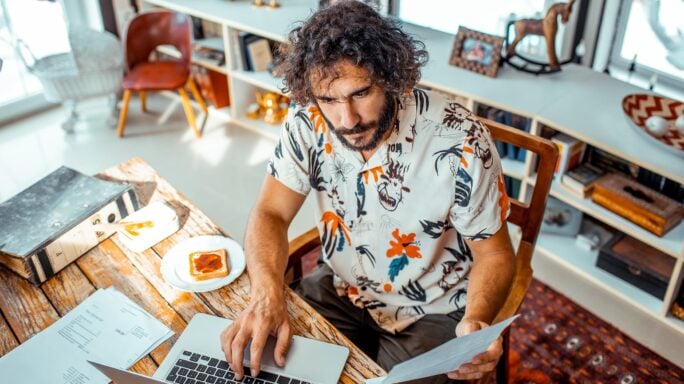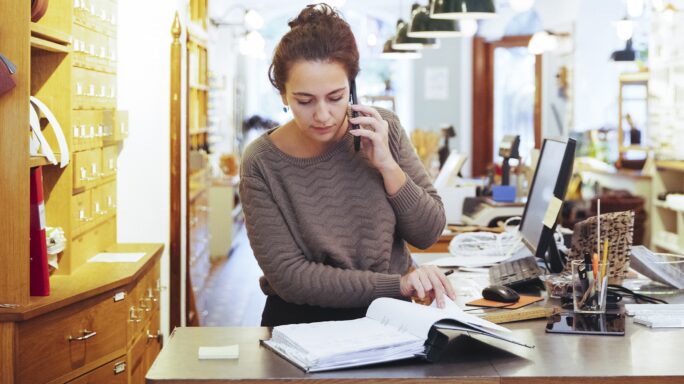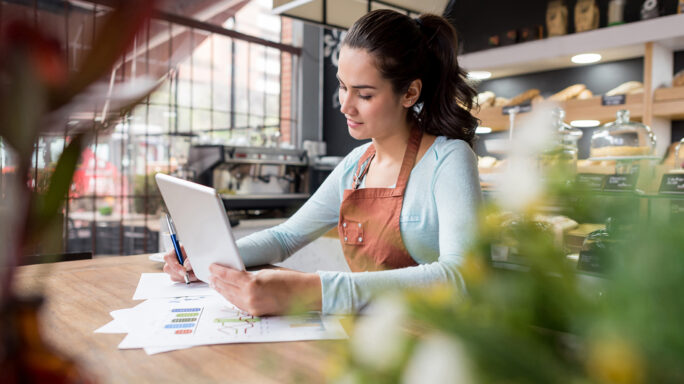The small business guide to accounting for coffee shops and cafés
Explore our guide to accounting for coffee shops and cafes. Get tips on bookkeeping, choosing software and more for your small business.

When starting your own café or coffee shop, it’s a thrill to throw open your doors to customers. But don’t forget good financial management is critical to success.
It’s more important than ever given the uncertainty of demand we all still face due to pandemic.
Simple coffee shop bookkeeping is a retrospective record of money flowing in and out of your business. It focuses on recording and organising financial information.
Meanwhile, accounting goes much further as it also involves interpreting this information to support the business.
When it comes to cafés, accounting allows you to track key performance indicators in more detail, including cost of goods sold (CoGS), stock levels, cash flow and gross profit to make sure your business is profitable and sustainable.
Alongside these techniques, accounting software is essential to make your café run smoothly and efficiently, especially as modern packages now integrate seamlessly with electronic point of sale (EPOS) systems, to help manage your sales data, and auto data capture systems to record all your invoices, receipts and other information.
Here’s what we cover in this article:
Do you need an accountant for a coffee shop?
Why do café businesses need accounting software?
How do you keep financial records for a small café?
How do you categorise and calculate café expenses?
Do cafés use cash or accrual accounting?
Browns aims high with cloud technology
Lost Sheep shears costs with expert guidance
Next steps: Prioritise accounting to make your café a success
Do you need an accountant for a coffee shop?
Accountants help cafés and coffee shops manage their bigger financial picture, from analysing financial information to auditing and forecasting future requirements.
Modern accountants make sure a business complies with its financial obligations, for example, in terms of record keeping and tax filing. They advise on structuring in the most tax efficient away, covering things like choosing the right VAT status, for instance.
They also help you plan and manage risk effectively, including how you manage your debt levels.
Seasoned accountants can also provide valuable business advice, helping improve cost efficiency and measure business performance and cash flow more effectively, which is all important to success in a café.
When choosing an accountant, look for one who has specialist experience working with cafés and is prepared to work with you long-term to understand your needs and aspirations fully.
Accountants also often act as a sounding board for business owners’ ideas and issues.
Why do café businesses need accounting software?
The benefits of accounting software for a café or coffee shop include more in-depth and comprehensive reporting abilities, which drastically reduces time spent on manual financial processes and data entry.
Many software packages enable a better flow of information from the café to your accountant and back, allowing better analysis of data, in real time.
These perks mean you can spend more time perfecting your coffees and sandwiches, creating menus, and developing your business.
State-of-the-art software can also integrate with bank accounts, and EPOS, stock, and rota management tools and systems.
This can make a vital difference in running a café seamlessly and efficiently because it helps you automate and manage your accounts with ease.
It reduces manual errors, gives you more control over stock, and improves customer service, sales opportunities and spend management.
A good EPOS should also supply you with real-time information to support faster business decisions.
Emma Ball, partner at Alexander & Co Chartered Accountants, specialises in working with restaurant and café owners.
She says: “Choosing a software package that is Making Tax Digital (MTD) compatible is important for many cafés. VAT registered businesses with turnover above the £85,000 threshold are now required to file VAT returns using MTD compatible software.
“Registered businesses below the threshold will need to do this in 2022.
“Unincorporated businesses may also be required to meet MTD income tax self-assessment (ITSA) requirements in 2026, so make sure your software is compatible now.”
How do you keep financial records for a small café?
All businesses must keep records of all their spending and transactions, under the Companies Act 2006.
Since many cafés operate on small margins, keeping detailed accounting records is essential, anyway, to understand your costs and the implications for your bottom line, and avoid falling foul of various tax rules.
Ball advises: “One of the easiest ways to ensure good record keeping is to use an accounting software package that can link with your business bank account, so the system recognises and records all transactions, including payments and receipts.
“A user-friendly software package can meet the record keeping needs of café owners, with little or no technical knowledge.”
How do you categorise and calculate café expenses?
Like all businesses, coffee shops need to break down their costs into categories, so they can see if any are becoming too expensive and need changing to maintain gross margin targets.
“Hospitality industry profits has been impacted significantly by rent and business rate increases for many years,” says Ball.
“With the furlough scheme winding down, staff costs are also likely to impact the sector more in the second half of 2021.
“It will be vital for cafés to know the cost of their goods and sales margins, so they understand how much they need to charge to operate successfully.”
How you categorise your costs depends on your business model and preferences.
But you could, for example, break down cost of sales into food ingredients, drink ingredients, other retail, packaging and other direct expenses.
Staffing is your main fixed cost, so this should include subcategories such as salaries, National Insurance, training, pensions and welfare.
You could categorise other fixed costs under rent, rates, utilities, services, insurance, technology, office equipment and restaurant equipment.
You accounting software will help you calculate and segment all these expenses accurately and efficiently.
Do cafés use cash or accrual accounting?
The difference between cash and accrual accounting depends on the timing of invoices compared with the timing of payments for those invoices.
Accrual accounting lines up transactions with when you earn them; cash accounting focuses on when they are actually paid.
If your café is a limited company and/or if your turnover is over £150,000, you must prepare your accounts on the traditional accrual basis.
This means the year-end accounts must reflect all outstanding receivable and payable amounts.
If you are self-employed and earning under that, you can use cash accounting.
Because it simply records cash in and out, cash accounting makes it much easier to complete your own accounts and Self Assessment.
But cash accounting isn’t always the best method for tax purposes.
For example, if you haven’t yet paid a large stock or utility bill, that can make your cash profit look better than it actually is. Using accrual accounting means you only pay tax on the true profit.
Browns aims high with cloud technology
Ross Brown started Browns of Brockley in 2009 and has recently expanded from one coffee shop to three plus a mobile unit.
Brown says the advent of cloud-based technology over the past decade has made running the business much better and easier, and helped him drive the business to greater heights.
For example, Browns has adopted an app that snaps invoices and stores them in the cloud. “That saves a lot of space. I paid someone last week to take away old receipts in 11 black sacks,” he says.
With help from its accounting system and other software for small businesses, the café has also become much more data-driven.
“I have no idea what shape the business was in 10 years ago because we didn’t keep records in the same way,” says Brown.
“Our first till system was analogue. Now I can log into the integrated cloud-based system wherever and whenever I want and extract whatever data I need.
“The system also saves so much time as bank and credit card feeds go straight into the accounting software, and I can report from there direct to HMRC.
“Even the boring stuff like comparing supplier invoices is quicker as all invoices are coded and fed into the software.
“Accounting software is relatively cheap. Compared to what you used to have to do, it feels like incredible value.”
It’s a small price to pay to help fulfil your potential as a successful cafe owner.
Lost Sheep shears costs with expert guidance
Accounting can make all the difference with smaller, younger coffee shop businesses too.
When Stuart Wilson founded Lost Sheep Coffee in 2017, he initially did his own bookkeeping.
But he quickly realised the need for a specialist accountant.
“Real Time Information (RTI) – HMRC’s requirement to send electronic pay details on or before the time we pay our employees – was the bane of my life,” he says.
“But, as we got larger, we got an accountant on board who could handle that for us.
“When we hit £500,000 turnover, we moved everything fully across to the accountant.
“Now I can do many more useful things such as sending them pictures of receipts and raising invoices through the accounting software.
“They reconcile everything, and I can get my reports off to HMRC whenever I need to.”
Wilson says the chief benefit of using an accountant is in saving him time. But they also make the business as tax efficient as possible, for example, nailing down VAT rebates to minimise VAT bills each quarter.
“They even made us aware of grants available – for example, for eco-lighting,” says Wilson.
“I got a grant of 70% of the cost of replacing my lights and that saves me £400 a month on electricity.”
Lost Sheep’s accountant sends management accounts every month, allowing Wilson to make changes quickly when needed.
Wilson says: “I can also check whatever information I need through the accounting software in real-time.
“For example, I can see where I am on my VAT bill and save a suitable amount.
“That helps a lot because cash is so important for our business. I can also monitor all my costs and see what our margins are in real-time.”
One major challenge for Lost Sheep has been suppliers sometimes raising prices without telling him.
“If you’re not monitoring that, you could go several months before you realise your gross profit has fallen as a result,” says Wilson. “Tracking margins regularly allows me to identify issues like that quickly and react. For example, we spend tens of thousands with one supplier who did this.
“So I called them and they put the price straight back down.”
More widely, the accounting software allows him to budget, do cash flow forecasts and make decisions based on accurate, real-time data.
Next steps: Prioritise accounting to make your café a success
Your focus when opening new coffee shop is likely on enticing customers with fabulous sights, smells and tastes. But behind the grind, a thorough understanding of finance is essential to making it a long-term success.
So learn as much as you can about accounting for cafés.
Get advice from others with experience.
Use this guide to build a solid, efficient financial structure into your business plan.
And, most importantly, start shopping around for a specialist accountant and scalable accounting software. It’s the best way to turn your dreams of a thriving business turn into hot cup of reality.
Small business toolkit
Get your free guide, business plan template and cash flow forecast template to help you manage your business and achieve your goals.







Ask the author a question or share your advice